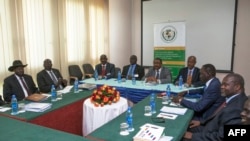Talks to end 15 months of conflict in South Sudan broke down Friday -- a day after an international deadline to reach a peace deal came and went. IGAD, the East African bloc mediating the talks, will now have to decide the way forward. Negotiations have been going on for the past two weeks.
South Sudan's President Salva Kiir and his former deputy Riek Machar walked away from the negotiating table Friday afternoon in Addis Ababa. They could not reach an agreement, even with a one-day extension on a March 5 deadline set by IGAD.
Rebel leader Machar blamed the government for the impasse.
“We have done our best to arrive to a peace agreement but it has not become possible, because of the positions being represented by the government. We are not accepting defeat,” he said. “The [Ethiopian] prime minister promised that there will be a new mechanism for the talks so we will wait to when this mechanism is going to be formed, to continue the peace talks.”
Ethiopian Prime Minister Hailemariam Desalegn was present during Friday’s face-to-face talks. He told both leaders that prolonging the war is “unacceptable, both morally and political” and that the regional mediation body IGAD will “hold the parties to their commitment to form a transitional government by July of this year.” He added that he will consult with regional heads of state in the coming days with the intention to “implement a common plan."
South Sudan’s Minister of Information Michael Makuei said more time is needed for the sides to work out disagreements over the structure of a unity government, including the ratio of power-sharing and institutional reforms. He refused to call the talks failed.
“We cannot say that there is a failure, but there is progress being made. So we are optimistic that after consultations and when we are called back, definitely we will be in a position to agree and take peace to our people in South Sudan,” he noted.
Because of the failure to reach a comprehensive deal by March 5, the U.N. Security Council can now impose travel and financial sanctions on individuals seen as obstructing the peace process.
South Sudan only gained independence from Sudan in 2011. A political rift between President Kiir and Machar triggered the ongoing conflict, with tens of thousands killed and nearly two million people displaced.











